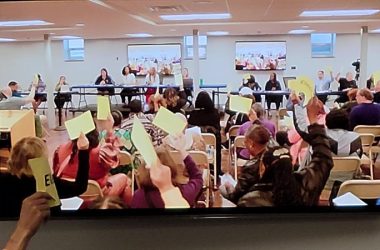As a multi-year budget deficit continues, Flossmoor officials are looking for ways to increase municipal revenues without overburdening village residents with more taxes.
At a special village board meeting Monday, they considered options to deal with a deficit that’s projected to climb to $1.5 million in the next three years. Board members and village department heads discussed possible financial actions during a session on Flossmoor’s proposed strategic plan, which is close to approval.
The most likely alternative appears to lie with an extra 1 percent in local sales tax. In Flossmoor, a community that does not have home rule, that would require the approval of residents in a referendum vote. Adding an additional one cent tax for each dollar of sales in Flossmoor would annually generate another $580,000, according to projections by village staff.
“I can’t see how we can’t do this,” Mayor Paul Braun said Monday.
There was general support for the sales tax hike. Officials said it would pose less of a burden for local taxpayers since the majority of shoppers at the Meijer superstore ― Flossmoor’s biggest source of retail sales ― are not village residents.
Several other potential sources of revenue were also discussed. They included a utility tax on water, increasing fees at the village’s commuter parking lots, a hike in fees for local vehicle stickers and a “license to eat” tax on restaurants and stores that sell takeout food.
There was little support for the water tax, which is seen being especially burdensome to Flossmoor residents. Hikes in village sticker prices and parking lot fees are likely to get further village board consideration.
Board members are expected to officially receive the strategic plan at their Oct. 2 meeting. After the plan is adopted, the village will move ahead on what will be a municipal blueprint for the next five years. The plan prioritizes needed actions in five key areas ― infrastructure, economic development, finances, diversity and housing.
Action could come soon if the board wishes to implement the 1 percent sales tax increase. Braun said the village will need to take action on a possible referendum as early as December if the proposal is to be on the ballot in the consolidated election next March. Village Manager Bridget Wachtel said local supporters of the sales tax hike would need to start putting together an education campaign by the end of the year.
In her presentation to the board Monday, Wachtel said the village’s projected $1.5 million deficit, expected in the 2020 fiscal year, will bring village general fund reserves below a level that is mandated by the board. When the current budget was approved in April, Flossmoor had $5.6 million in reserves. In 2020, reserves are projected to fall below $3 million, Wachtel told the H-F Chronicle.
This year, the village has an anticipated deficit of $566,000. Next year, FY2019, it is expected to climb to $979,000.
There are several reasons behind Flossmoor’s general fund deficits. The village’s equalized assessed valuation ― the taxable amount of all local property ― has fallen sharply since the 2008 recession. State-mandated pension costs for police and fire department members continue to go up. Flossmoor’s infrastructure is aging and in constant need of repair.
“We just have more expenditures than revenues,” Braun told the H-F Chronicle on Monday.
In a wide-ranging discussion at the special session, village officials also examined other important priorities.
Flossmoor’s top economic development priority is the successful acquisition of four tax-delinquent properties located north of Vollmer Road between the Meijer complex and Central Park Avenue. The village is expecting to take title to those properties through Cook County’s No Cash Bid program. When that happens, Flossmoor hopes to develop land along Vollmer and 198th Street as a commercial area that will boost the village’s tax base.
However, another key priority is the retention of existing businesses, especially in the downtown area. Village officials plan to meet with downtown business owners in coming weeks to discuss possible strategies for filling vacant properties and helping existing retail and service outlets.
Board members suggested the possibility of downtown Flossmoor being turned into a tax increment financing district, which would provide incentives for development. Wachtel said downtown Flossmoor’s future could include redeveloped housing for young millennials and older empty-nesters.
The strategic plan was developed after more than 1,000 residents took part in a May survey gauging Flossmoor’s strengths and weaknesses. The survey was followed by two public meetings at which residents offered their opinions on what the village needs to do. In July, the village board held two special meetings that dealt solely with the strategic plan.



